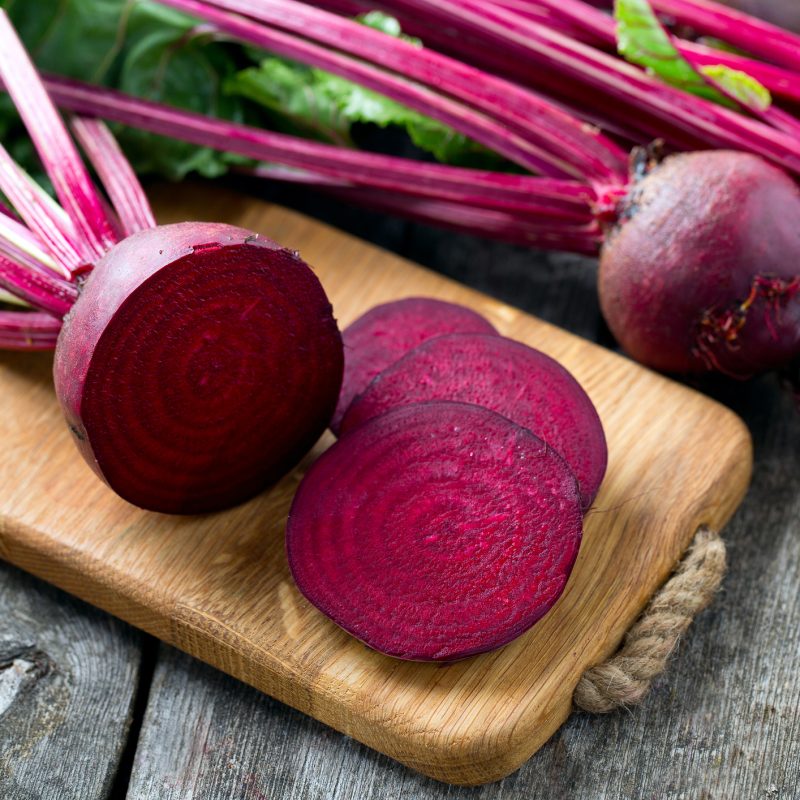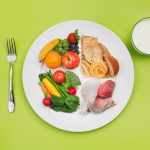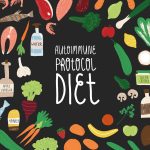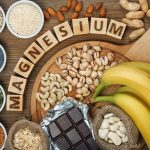
In recent years, nitrates have enjoyed a meteoric rise in popularity, promising game-changing performance enhancement for athletes and fitness enthusiasts looking to gain a competitive edge. By increasing nitric oxide production in the body, nitrates facilitate the relaxation and dilation of blood vessels, allowing for improved blood flow and oxygen delivery to the muscles. This enhanced circulation can ultimately help promote improved endurance and reduced fatigue, both of which contribute to superb athletic performance. In this article, we dive into the dietary sources of nitrates, as well as the mechanisms that occur within the body upon ingestion of nitrate-rich foods and/or supplements. Read on to discover why beetroot juice may soon play a leading role in your clients’ meal plans!
The Role of Dietary Nitrates
Inorganic nitrate, found in many popular fruits and vegetables, takes an interesting and ultimately powerful route throughout the human body upon ingestion. Following a meal/snack/oral supplementation high in nitrates, this compound converts in the body to nitrite and gets stored/circulated in the bloodstream. In conditions of low oxygen availability, nitrite can be converted into nitric oxide, a substance known to play a number of important roles in both vascular and metabolic control. Dietary nitrate supplementation increases plasma nitrite concentration, thereby lowering one’s resting blood pressure. Intriguingly, nitrate supplementation also reduces the oxygen cost of submaximal exercise and can, in some circumstances, enhance exercise tolerance and performance.
Found in abundance in beetroot juice, dark green leafy vegetables, and pomegranate extract, scientists originally began studying these bioactive compounds for their role in cardiovascular health, and upon recognizing them as signaling molecules. Nitric oxide and its vasodilation properties led to studying the potential effects on exercise performance. Due to its purported effects, nitrate supplementation figures prominently among endurance athletes.
The Digestion/Metabolism Process of Nitrates
The secret power of nitrates lies in their ability to elicit an increase in nitric oxide levels in the body. Those occurring naturally in beetroot juice and leafy vegetables confer benefits to the body, unlike the synthetic nitrates against which scientists warn, such as those found in processed meats.
Nitrates, once consumed, pass through a number of processes. Following consumption, nitrate first undergoes conversion into nitrite, and further to NO (nitric oxide). While dietary sources and the L-arginine–NO synthase pathway serve as the primary sources of nitrates and nitrites in the body, NO can also result from a reduction in nitrate by oral bacteria, a topic we shall address later in this article. As powerful vasodilators, nitrates increase oxygen via blood flow to the muscles, where it has the potential to improve muscle function, especially during aerobic exercise. Some research evidence supports the notion that nitrates influence cellular respiration by increasing mitochondrial biogenesis. Data also points to the notion that nitrates may increase the number of glucose transporters and/or insulin availability, resulting in improved adenosine triphosphate (ATP) synthesis, the body’s key energy source.
Digestion of ingested nitrates begins in the mouth, where approximately 25% of it gets broken down by saliva via anaerobic bacteria that reside there naturally. Further nitrate reduction occurs later in the stomach, due to the low pH of the environment, followed by more reduction in the gastric lumen as a result of a non-enzymatic chemical reaction. Most of the circulating nitrate eventually gets excreted through urine; however, approximately 20–25% of this remaining nitrate gets taken up by the pancreas from the bloodstream and concentrated in saliva. Through the NO3−–NO2−–NO pathway of degradation, endogenously ingested nitrates get recycled by oral bacteria and act as a kind of reservoir of nitric oxide synthesis precursors.
The Mouthwash Connection
While just about every dentist stresses the importance of mouthwash in one’s twice-daily dental hygiene routine, several large studies have demonstrated that antiseptic mouthwashes directly align with mortality in hospitalized patients. In the absence of a clear pathogenic mechanism, such data lead first to controversy and then to a general reluctance to abandon or limit the use of antiseptic mouthwashes. Some scientists have generated the hypothesis that a disturbance in nitric oxide homeostasis by antiseptic mouthwashes may serve as the culprit responsible for the observed increase in mortality risk. A reduction in nitric oxide bioavailability, given its essential role in multiple physiological processes, could be associated with the occurrence or worsening of pathologies, such as atherosclerosis, diabetes, and sepsis. The body needs oral facultative anaerobic bacteria in order for the entero-salivary nitrate–nitrite–nitric oxide pathway to function, due to their capacity to reduce nitrate to nitrite. Nitrate originates from dietary sources or from the active uptake by salivary glands of circulating nitrate, which is then excreted in the saliva. Overuse of antiseptic mouthwashes eradicates the oral bacterial flora, thereby limiting or totally abolishing the nitric oxide-generating pathway, which may result in nitric oxide-deficient conditions. These conditions can potentially lead to life-threatening health complications such as ischemic cardiac events or sepsis. Evidence shows that nitrate-rich beetroot juice holds potential effects against developing cavities by thwarting the acidification of saliva.
Cost-Efficient Energy Utilization
Nitrates increase exercise efficiency to a great extent by reducing the energy cost of exercise. Larsen et al. undertook a study designed to investigate whether dietary nitrate had any effect on metabolic, physiological, and circulatory parameters during exercise. In this study, participants consumed either nitrates or a placebo for 3 days, followed by a 10-day washout period. The researchers instructed their subjects to abstain from eating foods with high–moderate nitrate content for the duration of the experiment. Following supplementation, participants completed submaximal and maximal work tests on a cycle ergometer. At submaximal workloads, scientists noted a reduction in oxygen demand. Work efficiency increased, suggesting that the body used energy more efficiently during submaximal work.
In a similar study lasting 6 days, Baily et al. gave participants either 5.5mmol/day of nitrates derived from beetroot juice or a placebo. Moderate and intense exercise assessments conducted on days 4, 5, and 6 of the experiment showed a reduction in oxygen uptake as well as an increase in reported time to exhaustion.
Additional research has supported these results, showcasing how the combination of a supplement rich in beetroot juice and moderate exercise enhanced both aerobic exercise capacity and improved cardiovascular function in healthy adult males. Interestingly, no significant changes in blood pressure, the oxygen cost of exercise, or exercise performance occurred under placebo conditions, confirming that the benefits originated solely from the consumption of nitrates in the beetroot juice.
Nitrates and Strength Training
The benefits of nitrate supplementation transcend the realm of aerobic exercise. In a double-blind randomized study, 12 participants consumed beetroot juice containing 6.4 mmol of nitrates or a placebo, with a washout period of 72 hours. Based upon their reported 1RM, participants completed three sets of bench press at 60% 1RM until failure set in. Scientists noted a significant improvement in the total amount of weight lifted and the number of repetitions to failure.
Supplementation versus Dietary Intake
Experts readily admit that concrete knowledge of the effects of nitrate supplements (based on habitual dietary nitrate intake through diet alone) remains in its infancy. In an attempt to better understand the interplay between these 2 commodities, scientists recruited 15 highly-trained football players hailing from Slovenia. These subjects engaged in 2 Cooper performance tests while consuming either a placebo or 400 mg of nitrate supplementation. During the testing, researchers also assessed the football players’ dietary intake in terms of nitrates, macronutrients, and overall energy consumption.
If a subject’s dietary nitrate intake fell below 300 mg, then supplementation had a statistically significant positive effect on performance. However, when dietary intake exceeded 300 mg, the additional supplementation did not yield any additional benefit in athletic performance.
Mechanisms of Ergogenic Action
Nitrate, or NO3−, may improve sports performance through a variety of routes: skeletal muscle, blood vessels, and the brain. The resulting increased NO availability can affect mitochondrial respiration and biogenesis, increase blood flow in active muscles during physical activity, and consequently reduce adenosine triphosphate (ATP) consumption during muscle contraction, as referenced above. The effect of nitrate on blood vessels manifests through a reduction in blood pressure. In addition, some research hints that nitrate may also increase heat loss through the skin during physical activity.
Nitrates and the Well-Trained Elite Athlete
The body of an elite athlete often responds differently to a variety of exposures than does that of an average weekend warrior. Scientists have found evidence that nitrate supplementation effects seem less pronounced in elite athletic users. Still, the International Olympic Committee (IOC) considers nitrates one of a handful of dietary supplements with a direct, positive effect on an athlete’s performance. To that end, even professional athletes may still wish to consider nitrate supplementation; it may prove especially helpful on a competition day, when even a sliver of time can make the difference between 1st and 2nd Place.
We must also take into consideration the idea that well-trained athletic individuals tend to favor healthy, natural food sources in their meal planning. We might correctly assume that the majority of elite athletes work with dietitians, ensuring that their meals contain significant quantities of foods rich in nitrates as well as L-arginine and L-citrulline. This factor, in and of itself, renders the effects of supplementation less obvious. Still, if one’s diet lacks certain foods due to specific allergies or other health restrictions, supplementation will definitely yield greater benefits. We notice a similar pattern with vegan athletes; they often supplement with creatine since their regular menus lack meat, eggs, and fish, the predominant dietary sources of creatine.
Cognitive Athletic Benefits
Athletes who play team sports know the importance of making split-second decisions during competitive games. Extended bouts of high-intensity exercise can take their toll on one’s reaction time as well as cognition/task performance. Owing to its influence on blood flow and cellular energetics, nitrate supplements seem to offer a statistically shorter reaction time.
A 2015 study looked at the effects of nitrate supplements on 16 team-sports athletes, given over 7 days. The study involved a prolonged intermittent sprint test protocol, designed to mimic the work patterns engaged in during team play. The resulting data suggest that supplemental dietary nitrate enhances performance on repetitive sprints and may attenuate the decline in cognitive function/reaction time that often presents a challenge with prolonged intermittent exercise.
Effects of Nitrate Supplementation for Performance Under Extreme Conditions
Just as runners often train at varying elevations in an effort to acclimate their bodies to reduced levels of oxygen, any athlete finds it challenging to exercise in hypoxic (reduced available oxygen) and extremely cold environments. Since altitude acclimatization can potentially take weeks to accomplish, scientists purport that nitric oxide plays an essential role in hypoxia-induced vasodilatation, thereby ensuring adequate supplies of oxygen availability to the working muscle and brain tissue during hypoxic conditions. Data reflect how supplemental nitrates lead to improved mitochondrial respiration and oxygen consumption during exercise.
Food Sources and Supplementation
Compared to the processes that occur within the human body in creating nitric oxide from nitrates, nutrition – think of a bowlful of dark leafy greens or a glass of beetroot juice- represents the greatest potential for supplying the body with high amounts of nitrates.
However, the nitrate content of these food sources can vary greatly, depending on the following factors ~
- the origin of the vegetable
- the quality and pH of the soil in which growth occurs/weather conditions during growth
- type and frequency of nitrogen fertilizers
- type of vegetable cultivation
- time of vegetable harvesting
- age of the plant at harvest
- conditions of vegetable storage
- method of vegetable preparation
As such, it proves difficult to make a specific recommendation for athletes, in terms of meeting or exceeding their nitrate needs through diet alone or if supplemental nitrate might help. Research indicates that consumption of beetroot juice improved exercise performance better than nitrate salt supplementation. This seems to peak with exercises lasting between 2 and 10 minutes.
Beetroot: Points to Ponder
Most studies of dietary nitrate and its effects on exercise have relied on beetroot juice as their source of choice. Consequently, some undocumented articles available in the media may extoll the virtues of beetroot juice supplementation as an ergogenic aid; a large variety of beetroot juice supplements in various forms — powders, mixed drinks, concentrates, bulk juice – directly market their products to athletes. Many of these fail to list their nitrate content, particularly those that choose not to seek out independent testing. Even some scientific studies fail to verify the nitrate content of the supplement used, relying instead on assessing biomarkers of nitric oxide bioavailability to ensure that an adequate dose was delivered. Athletes and/or coaches, therefore, may tend to rely on “blind faith” that any beetroot supplement actually contains sufficient nitrate to provide physiological benefits.
Optimal Food Sources
As we touched upon earlier in the article, leafy greens like spinach, kale, arugula, and cabbage top the list of the best sources of dietary nitrates. As a bonus, these vegetables pack a significant punch of vitamins and minerals, particularly vitamin C, which can further enhance the bioavailability of nitric oxide in the body.
Beets boast the ability to significantly boost nitric oxide levels in the body, which can improve blood flow and lower blood pressure. Many important antioxidants also come from beets, such as betalains, which can reduce inflammation and support overall cardiovascular health. Although they may not tickle the taste buds of everyone, beets can figure prominently as a delicious roasted side dish, sliced or slivered into salads, or added to a protein smoothie.
Watermelon, a summer favorite, offers hydration as well as a substantial quantity of nitrates. A typical serving of watermelon also contains the amino acid citrulline, another substance involved in the conversion of nitrate to nitric oxide, as well as lycopene, known for its anti-inflammatory properties and cardiovascular benefits.
Final Thoughts
Speculations based on current data regarding the average nitrate content of certain foods, beetroot, endive, fennel, kohlrabi, lettuce, bok choi, radish, and spinach, place a minimum daily healthy amount of nitrate at 150 g. Coaches might try to encourage their athletes to weave in approximately 250–500 g of leafy and root vegetables per day to ensure adequate dietary nitrate intake.
Incorporating nitrate-rich foods into a regular meal plan may provide just the edge needed to push through tough workouts en route to achieving fitness goals. Whether one considers themselves a seasoned athlete or has recently embarked upon an exercise/wellness journey, the benefits of nitrates for athletic performance seem undeniable.
References
https://www.sciencedirect.com/science/article/pii/S1089860316301409
https://pmc.ncbi.nlm.nih.gov/articles/PMC7567004/
https://pmc.ncbi.nlm.nih.gov/articles/PMC8512783/
https://pubmed.ncbi.nlm.nih.gov/24791915/
https://pubmed.ncbi.nlm.nih.gov/35580578/
https://pubmed.ncbi.nlm.nih.gov/25846114/
https://pmc.ncbi.nlm.nih.gov/articles/PMC10489871/
https://pmc.ncbi.nlm.nih.gov/articles/PMC6147587/
https://pmc.ncbi.nlm.nih.gov/articles/PMC8465461/
https://pmc.ncbi.nlm.nih.gov/articles/PMC11479151/#sec5-nutrients-16-03247
https://pubmed.ncbi.nlm.nih.gov/17635415/
https://pubmed.ncbi.nlm.nih.gov/29559721/
https://pubmed.ncbi.nlm.nih.gov/26681629/






